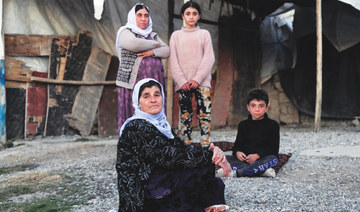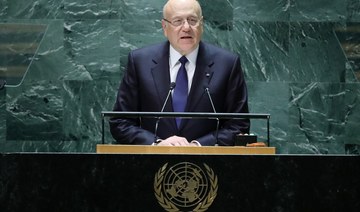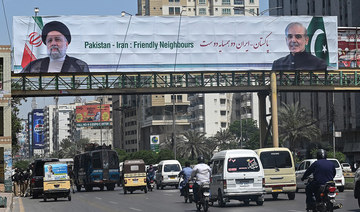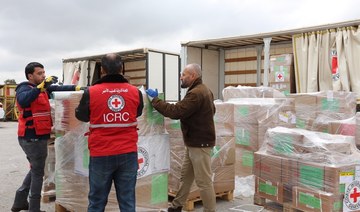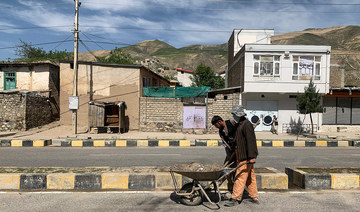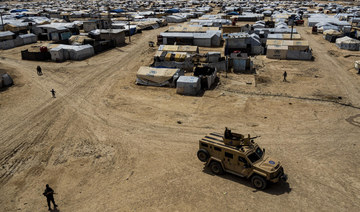ISTANBUL: Anti-migrant sentiment, economic woes and political pressures are leading some of the 3.3 millions Syrians living in Turkiye to plan a return to Syria or seek shelter in Europe, according to migrants interviewed by Reuters.
They are concerned that rhetoric against migrants may rear up in campaigning for March local elections, echoing efforts to tap into nationalist sentiments during May’s general elections.
Many of those now living in Istanbul face a more immediate worry — authorities’ Sept. 24 deadline for them to leave the city if they are registered in other Turkish provinces.
One 32-year-old Syrian said he is saving up to pay smugglers and plans to go to Belgium. Hardship caused by Turkiye’s rampant inflation and anti-migrant rhetoric motivated his decision.
“We are blamed and scapegoated for the worsening economy. Discrimination is rising. It is becoming impossible for us to live here,” he told Reuters, declining to give his name for security reasons.
The 32-year-old is among those affected by Sunday’s deadline because he was registered in southeastern Sanliurfa province.
According to rights groups, racist violence against Syrians is increasing and authorities have adopted a tougher policy on migrants not registered in Istanbul, stoking migrants’ fears.
Another Syrian man, a 33-year-old teacher, said he could no longer afford to live in Turkiye after 10 years spent in Istanbul with his two children, with his expenses exceeding his income.
“I decided to return to Syria because of the bad financial situation in Turkiye. I know the situation is bad in Syria too but here it’s worse for me,” he said, declining to be named.
It was not possible to quantify the number of Syrians currently planning to leave for Europe or return to Syria.
Turkiye is home to 3.3 million Syrians with temporary protection permits, according to Turkish authorities. Istanbul has the highest Syrian population with more than 532,000.
While Syrians were assigned to provinces throughout Turkiye, many went to Istanbul due to more job opportunities. Authorities said it was unclear how many such people there were in the city.
DEADLINE TO MOVE
Adem Maarastawi, a 29 year-old Syrian activist working in Istanbul, is registered in central Turkiye’s Kirsehir province.
As Sept. 24 approaches, he fears being sent to Kirsehir.
“I struggled to build a life here. How can I rebuild my life from scratch in another city?” he said, adding that he looked for a job in more than 30 cities before settling in Istanbul.
Experts believe anti-migrant sentiment will dominate opposition campaigning for the March votes, as it did in the May elections, and worry this could lead to more physical and verbal violence against migrants including more social media hostility.
“Anti-migrant rhetoric is likely to rise before the March elections,” said Deniz Sert, associate professor of international relations at Ozyegin University.
Local government expert Ali Mert Tascier said opposition parties are likely to use anti-migrant rhetoric, with municipalities being the main players in managing migrants.
During campaigning for the May elections, the main opposition CHP vowed to send Syrians back. It declined to comment on its migration perspective for the local votes.
President Tayyip Erdogan has been fiercely critical of the opposition’s stance, telling a conference this week that Turkiye’s hosting of refugees would continue unchanged.
However, ahead of the May elections, Erdogan played up his plans to repatriate a million Syrian refugees.
“We will continue to pursue our voluntary return policy. It is, however, inappropriate to use migrants for political gain,” said Osman Nuri Kabaktepe, Istanbul head of Erdogan’s AK Party.
But Maarastawi said he feared such campaigning would lead to a deterioration in the situation for migrants.
“I believe everything will just worsen for us as a result of more populist discourse during the local elections,” he said.
Syrians feel growing pressure from Turkiye’s anti-migrant political wave
https://arab.news/jzs3a
Syrians feel growing pressure from Turkiye’s anti-migrant political wave
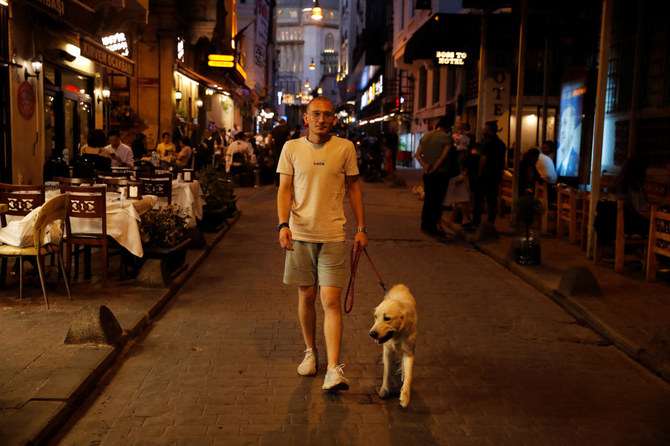
- Syrian migrants face deadline to leave Istanbul if registered elsewhere
- Many fear rise in anti-migrant rhetoric before March vote
Iran conservatives tighten grip in parliament vote

- Elected members are to choose a speaker for the 290-seat parliament when they begin their work on May 27
- Conservatives won the majority of the 45 remaining seats up for grabs in the vote held in 15 of 31 provinces: local media
TEHRAN: Iran’s conservatives and ultra-conservatives clinched more seats in a partial rerun of the country’s parliamentary elections, official results showed Saturday, tightening their hold on the chamber.
Voters had been called to cast ballots again on Friday in regions where candidates failed to gain enough votes in the March 1 election, which saw the lowest turnout — 41 percent — since the 1979 Islamic Revolution.
Candidates categorized as conservative or ultra-conservative on pre-election lists won the majority of the 45 remaining seats up for grabs in the vote held in 15 of Iran’s 31 provinces, according to local media.
For the first time in the country, voting on Friday was a completely electronic process at eight of the 22 constituencies in Tehran and the cities of Tabriz in the northwest and Shiraz in the south, state TV said.
“Usually, the participation in the second round is less than the first round,” Interior Minister Ahmad Vahidi told reporters in Tehran, without specifying what the turnout was in the latest round.
“Contrary to some predictions, all the candidates had a relatively acceptable and good number of votes,” he added.
Elected members are to choose a speaker for the 290-seat parliament when they begin their work on May 27.
In March, 25 million Iranians took part in the election out of 61 million eligible voters.
The main coalition of reform parties, the Reform Front, had said ahead of the first round that it would not participate in “meaningless, non-competitive and ineffective elections.”
The vote was the first since nationwide protests broke out following the September 2022 death in custody of Mahsa Amini, a 22-year-old Iranian Kurd, arrested for allegedly breaching the Islamic republic’s strict dress code for women.
In the 2016 parliamentary elections, first-round turnout was above 61 percent, before falling to 42.57 percent in 2020 when elections took place during the Covid pandemic.
UN reports fighting in Sudan’s Darfur involving ‘heavy weaponry’

- The United States last month warned of a looming rebel military offensive on the city, a humanitarian hub that appears to be at the center of a newly opening front in the country’s civil war
PORT SUDAN: A major city in Sudan’s western region of Darfur has been rocked by fighting involving “heavy weaponry,” a senior UN official said Saturday.
Violence erupted in populated areas of El-Fasher, putting about 800,000 people at risk, Clementine Nkweta-Salami, the UN’s humanitarian coordinator for Sudan, said in a statement.
Wounded civilians were being rushed to hospital and civilians were trying to flee the fighting, she added.
“I am gravely concerned by the eruption of clashes in (El-Fasher) despite repeated calls to parties to the conflict to refrain from attacking the city,” said Nkweta-Salami.
“I am equally disturbed by reports of the use of heavy weaponry and attacks in highly populated areas in the city center and the outskirts of (El-Fasher), resulting in multiple casualties,” she added.
For more than a year, Sudan has suffered a war between the army, headed by the country’s de facto leader Abdel Fattah Al-Burhan, and the paramilitary Rapid Support Forces (RSF), commanded by his former deputy Mohamed Hamdan Dagalo.
The war has killed tens of thousands of people and forced more than 8.5 million to flee their homes in what the United Nations has called the “largest displacement crisis in the world.”
The RSF has seized four out of five state capitals in Darfur, a region about the size of France and home to around one quarter of Sudan’s 48 million people.
El-Fasher is the last major city in Darfur that is not under paramilitary control and the United States warned last month of a looming offensive on the city.
UN chief Antonio Guterres said Saturday he was “very concerned about the ongoing war in Sudan.”
“We need an urgent ceasefire and a coordinated international effort to deliver a political process that can get the country back on track,” he said in a post on social media site X.
Tunisian police arrest prominent lawyer critical of president

- Dozens of lawyers took to the streets in protest on Saturday night, carrying banners reading “Our profession will not kneel” and “We will continue the struggle” Saied came to power in free elections in 2019
TUNIS: Tunisian police stormed the building of the Deanship of Lawyers on Saturday and arrested Sonia Dahmani, a lawyer known for her fierce criticism of President Kais Saied, and then arrested two journalists who witnessed the confrontation, a journalists’ syndicate said.
Two IFM radio journalists, Mourad Zghidi and Borhen Bsaiss, were arrested, an official in the country’s main journalists’ syndicate told Reuters. The incident was the latest in a series of arrests and investigations targeting activists, journalists and civil society groups critical of Saied and the government. The move reinforces opponents’ fears of an increasingly authoritarian government ahead of presidential elections expected later this year.
Dahmani was arrested after she said on a television program this week that Tunisia is a country where life is not pleasant. She was commenting on a speech by Saied, who said there was a conspiracy to push thousands of undocumented migrants from Sub-Saharan countries to stay in Tunisia. Dahmani was called before a judge on Wednesday on suspicion of spreading rumors and attacking public security following her comments, but she asked for postponement of the investigation.
The judge rejected her request. Dozens of lawyers took to the streets in protest on Saturday night, carrying banners reading “Our profession will not kneel” and “We will continue the struggle” Saied came to power in free elections in 2019. Two years later he seized additional powers when he shut down the elected parliament and moved to rule by decree before assuming authority over the judiciary.
Since Tunisia’s 2011 revolution, the country has won more press freedoms and is considered one of the more open media environments in the Arab world. Politicians, journalists and unions, however, say that freedom of the press faces a serious threat under the rule of Saied. The president has rejected the accusations and said he will not become a dictator.
Syrian Kurdish force hands over 2 Daesh members suspected in 2014 mass killing of Iraqi troops

- Iraq has, over the past several years, put on trial and later executed dozens of Daesh members over their involvement in the Speicher massacre
BEIRUT: Syria’s US-backed Kurdish-led force has handed over to Baghdad two Daesh militants suspected of involvement in mass killings of Iraqi soldiers in 2014, a war monitor said.
The report by the Syrian Observatory for Human Rights came a day after the Iraqi National Intelligence Service said it had brought back to the country three Daesh members from outside Iraq. The intelligence service did not provide more details.
Daesh captured an estimated 1,700 Iraqi soldiers after seizing Saddam Hussein‘s hometown of Tikrit in 2014. The soldiers were trying to flee from nearby Camp Speicher, a former US base.
BACKGROUND
Daesh captured an estimated 1,700 Iraqi soldiers after seizing Saddam Hussein‘s hometown of Tikrit in 2014.
Shortly after taking Tikrit, Daesh posted graphic images of Daesh militants shooting and killing the soldiers.
Farhad Shami, a spokesman for the Kurdish-led Syrian Democratic Forces, said the US-backed force handed over two Daesh members to Iraq.
It was not immediately clear where Iraqi authorities brought the third suspect from.
The 2014 killings, known as the Speicher massacre, sparked outrage across Iraq and partially fueled the mobilization of militias in the fight against Daesh.
Iraq has, over the past several years, put on trial and later executed dozens of Daesh members over their involvement in the Speicher massacre.
The Observatory said the two Daesh members were among 20 captured recently in a joint operation with the US-led coalition in the northern Syrian city of Raqqa, once the capital of Daesh’s self-declared caliphate.
Despite their defeat in Iraq in 2017 and in Syria in March 2019, the extremist sleeper cells are still active and have been carrying out deadly attacks against SDF and Syrian government forces.
Shami said a car rigged with explosives and driven by a suicide attacker tried on Friday night to storm a military checkpoint for the Deir El-Zour Military Council. This Arab majority faction is part of the SDF in the eastern Syrian village of Shuheil.
Shami said that when the guards tried to stop the car, the attacker blew himself up, killing three US-backed fighters.
No one immediately claimed responsibility for the attack, but it was similar to previous explosions carried out by IS militants.
The SDF is holding over 10,000 captured Daesh fighters in around two dozen detention facilities, including 2,000 foreigners whose home countries have refused to repatriate them.
Protesters return to streets across Israel, demanding hostage release

- Family members of the hostages, carrying pictures of their loved ones still in captivity, joined the crowds that demonstrated in Tel Aviv
TEL AVIV: Thousands of Israelis took to the streets on Saturday demanding that Prime Minister Benjamin Netanyahu’s government do more to secure the release of hostages being held in the Gaza Strip by Islamist group Hamas.
Family members of the hostages, carrying pictures of their loved ones still in captivity, joined the crowds that demonstrated in Tel Aviv.
One of them was Naama Weinberg, whose cousin Itai Svirsky was abducted during Hamas’ Oct. 7 assault on Israeli towns and, according to Israeli authorities, was killed in captivity. In a speech she referenced a video Hamas made public on Saturday, claiming that another of the Israeli captives had died.
“Soon, even those who managed to survive this long will no longer be among the living. They must be saved now,” Weinberg said.
As the evening progressed, some protesters blocked a main highway in the city before being dispersed by police, who used water cannons to push back the crowd. At least three people were arrested.
Hamas’ Oct. 7 attack sparked the devastating war in Gaza, now raging for nearly seven months.



